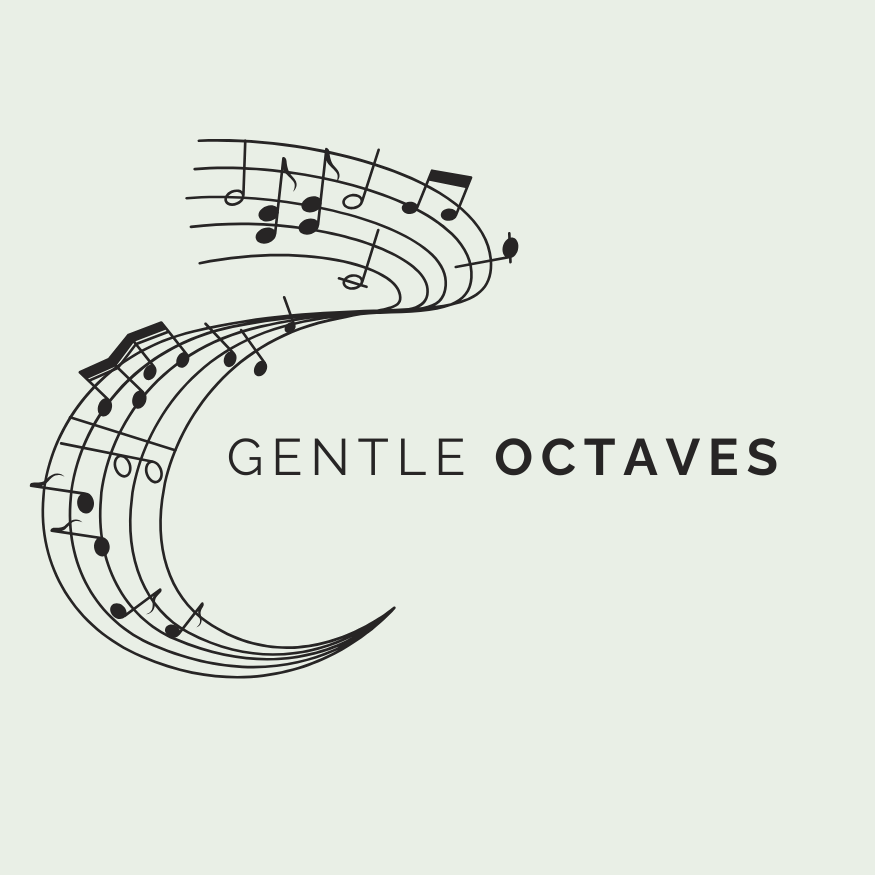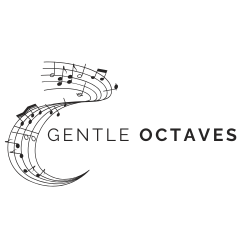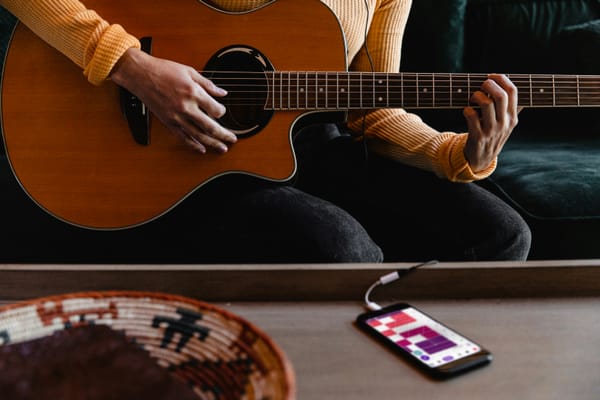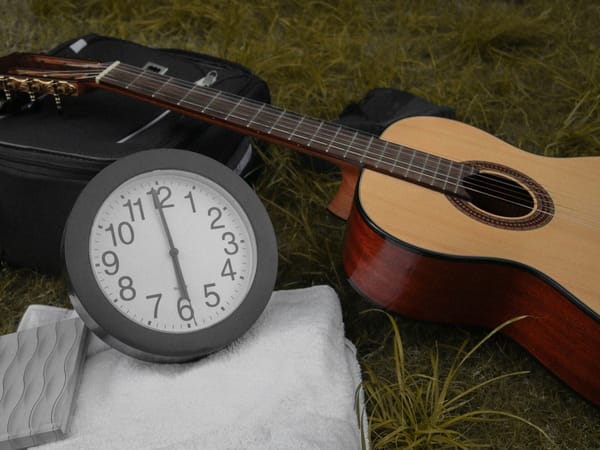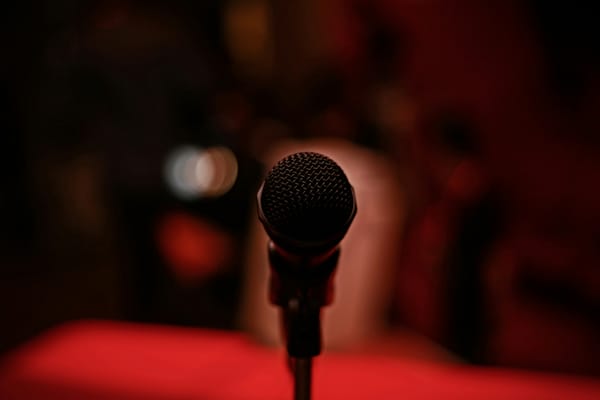Music Is Therapy - Until It Isn’t: Why Learning Can Sometimes Feel Stressful
Music heals - but the learning process can also stir stress, perfectionism, and tension. Here’s how to tell the difference and reset.

Music heals - but the learning process can also stir stress, perfectionism, and tension. Here’s how to tell the difference and reset.
You pick up the guitar to unwind. Ten minutes later your shoulders are up by your ears, your fingers sting, and your inner critic is giving a TED Talk.
Sound familiar?
You’ve just wandered from what was supposed to be relaxing, joyful, therapeutic even, into training, stress and frustration without noticing and the body felt the switch before the brain did.
Why Music Feels Like Therapy
Music isn’t just sound; it’s state change.
A few chords and your breath slows. A rhythm loop and your body syncs to it. That’s therapeutic: your nervous system falling into time with the beat. Dopamine nudges mood up. Muscles unclench. You feel safe again.
That’s why music is a lifeline for stressed adults. It’s a small room where the world can’t shout at you. It's time away from the worries of everyday life. Its mind body connection combined with rhythm and soul. It's that beautiful flow state that shows up sometimes when you are just in the moment and all the cares of the world seem to melt away.
Most people don't start an instrument or music specifically for its therapeutic benefits - it often starts just from a love of music or wanting to be able to make music in some way. Of course like a lot of things we want to control, when we actually go looking for it, it doesn't seem to show up. And when we forget about it, it seems to show up effortlessly.
The key is don’t chase music as therapy - create therapy through music.
When Music becomes Stressful
You had one of those days. Something, someone, sometimes - the world just reminds you it isn't an easy assignment this life thing.
There's always music though - maybe it's your guitar, a piano, or just putting on your favourite piece of music and singing along to it. You know this will help and you sit down looking forward to escaping the stress of it all and just letting go and letting the music help you relax.
The Hidden Cost of Stressful Practice
Stress hijacks breath and rushes rhythm. Tone gets tight. Joy drains.
Keep practicing in that state and the nervous system quietly files music under “danger.” That’s when people quit and say, “I thought this would help me. Why does it feel like work?”
If you’re grinding scales with a grimace, that’s not practice - that’s dental work.
Whats going on?
- Physical tension. Hands grip, shoulders creep, wrists complain. Technique turns into pain.
- Performance pressure. Even alone, you imagine an audience. Suddenly you’re auditioning for nobody.
- Overthinking. Too many details jam working memory. Brain fog meets body freeze.
We say, “this should be relaxing,” and then brace like we’re going into battle. The cares of the day dont melt away. And suddenly you're frustrated that you cant quite hit that note or transition the chord change like you should be able to. Music heals when you let go of control; it hurts when control won’t let go of you.
You need to learn how to let go before you start.
How to Bring Back the Healing Side of Music
Reset expectations
You’re not a machine; you’re a musician. Progress isn’t linear. Practice isn’t ruined by mistakes; mistakes are what make practice. Aim for useful reps, not spotless takes.
Regulate before you play
Sixty seconds: slow belly breath (in 4, out 6), shake out hands, roll shoulders, tap a steady four. Start from calm, not chaos. Focus grows roots when your body feels safe.
Use micro-sessions
Ten to fifteen minutes. Stop while you still want more. Ending on a good note teaches your brain to look forward to next time.
Reconnect with joy
Play the song that raised you. Sing badly on purpose. Improvise for two minutes with zero judgement. Remember why you came.
Therapy and Training: Hold Both Truths
Music has two faces. Therapy and training. Healing and hard work. Some days it restores you. Other days it stretches you. Both matter.
Name your mode before you start:
- Therapy mode: regulate, release, feel.
- Training mode: slow reps, clear goals, gentle pressure.
If stress outweighs joy, slide back into therapy mode. Don’t light yourself on fire to keep others warm — and don’t burn yourself to satisfy a metronome.
A 5-Minute Reset Flow (bookmark this)
- Two minutes — Breath-Body-Beat: in 4, out 6; shake hands; roll shoulders; tap a slow four.
- One minute — Joy loop: play something you love, no corrections allowed.
- One minute — Skill bite: one tiny rep (two bars, one shift, one chord change).
- One minute — Seal it: play the joy loop again and stop there.
That’s music as medicine and training, in balance.
Conclusion

Music should give more than it takes. If practice feels heavier than life, pause. Reset the frame. Choose therapy first, then add training in small, kind doses.
Because you don’t need extra stress disguised as self-care. You need sound that reminds you you’re safe, capable, and very much alive.
Before your next session, spend ten minutes in therapy mode and notice what changes: breath, shoulders, rhythm, mood. Tell me what shifted; your note might be the nudge someone else needs.
Gentle Octaves is a music coaching space for adults over 40 returning to creativity or just starting out. With a background in Psychology, Osteopathy, and Corrective Exercise, we help people overcome pain, anxiety, and self-doubt through music. Learn more or book a session here.
NEWSLETTER HTML
Sources
- Cepeda, N. J., et al. (2006). Distributed practice and learning. Psychological Science, 17(9), 779–788.
- Kenny, D. T. (2011). Music performance anxiety. International Journal of Stress Management, 18(2), 146–169.
- Koelsch, S. (2010). Neural basis of music-evoked emotions. Trends in Cognitive Sciences, 14(3), 131–137.
- Stoeber, J., & Eismann, U. (2007). Perfectionism in young musicians. Personality and Individual Differences, 43(8), 2182–2192.
- Thaut, M. H., et al. (2015). Rhythmic entrainment in rehab. Annals of the NY Academy of Sciences, 1337(1), 183–189.
